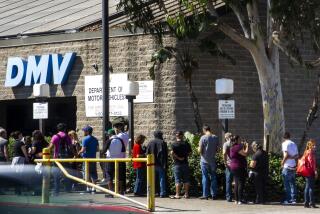Readers React: The risk of giving more rights to drunk-driving suspects
- Share via
To the editor: Let drunk-driving suspects refuse a mandatory biological sample (such as the option of breath or blood in California) without consequences, and watch alcohol-related roadway deaths spiral upward. (“Sobriety tests and the Constitution,” editorial, Dec. 16)
Why? Without the objective and usually conclusive evidence of a breath or blood sample available for trial, prosecutors will be left with largely subjective evidence. That enables defense attorneys to endlessly second-guess officers’ observations. This will leave legions of drivers undeterred by the perceived legal consequences of alcohol-impaired driving.
It’s hard to overstate the need to effectively combat the horrors that accompany alcohol abuse. That’s why legal niceties don’t preclude barring access to alcohol until age 21, though one’s majority is attained at age 18.
Rather than loosening our DUI laws, a good case can be made for tightening them, and many other countries impose a blood-alcohol limit about 40% lower than California’s, with far longer license suspensions for a DUI conviction.
Edward Alston, Santa Maria, Calif.
The writer is a retired deputy district attorney for Santa Barbara County.
..
To the editor: Your defense of individual rights as they relate to prosecuting suspected drunk drivers goes too far. Police personnel have to do their job, and a drunk driver endangering people’s lives on a road needs to be punished, end of story.
The saying, “If it walks like a duck, quacks like a duck and looks like a duck, then it’s a duck,” applies to driving under the influence. This country is already Disneyland for gun owners; let’s not make our highways a similar playground for drunk drivers.
Chet Chebegia, San Marcos
Follow the Opinion section on Twitter @latimesopinion and Facebook
More to Read
A cure for the common opinion
Get thought-provoking perspectives with our weekly newsletter.
You may occasionally receive promotional content from the Los Angeles Times.









